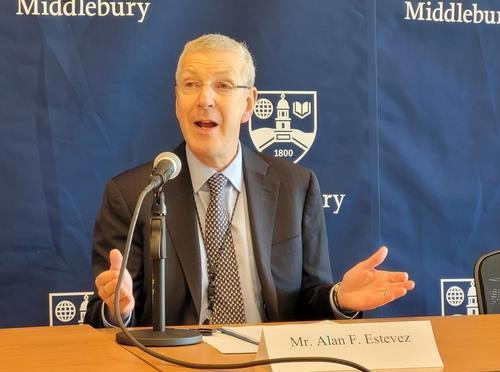Alan Estevez, the U.S. undersecretary of commerce for industry and security, commended the reported decision of Korean companies to cease selling used chip equipment to China, describing it as “encouraging” amid Washington’s efforts to urge tighter export controls on critical technologies. Estevez delivered these remarks during a forum in Washington, D.C., on December 12, 2023, and reiterated them in a written statement presented at a hearing of the House Foreign Affairs Committee, titled “Countering China on the World Stage: Empowering American Businesses and Denying Chinese Military Our Technology.”
In his statement, Estevez underscored the significance of allies and partners recognizing the threat posed by entities like the People’s Republic of China (PRC) and taking proactive measures to address security concerns related to semiconductors and other emerging technologies within their domestic legal frameworks. He highlighted the reported decision of major South Korean firms to halt the sale of used semiconductor manufacturing equipment to China, as well as similar actions taken by the governments of the Netherlands and Japan, which have announced and implemented controls on semiconductor manufacturing equipment.
Estevez’s remarks reflect the broader context of international efforts to strengthen export controls on key technologies in response to security challenges posed by the proliferation of advanced technologies to potential adversaries. The cooperation of allies and partners in implementing tighter controls underscores a collective recognition of the need to safeguard sensitive technologies and mitigate risks associated with their unauthorized transfer to entities like China.
Last week, the Financial Times reported that Samsung Electronics and SK hynix had decided to halt the sale of old chipmaking equipment, a move seen as a response to Washington’s calls for heightened export controls on semiconductors. The decision was confirmed by the Korean companies to the Korea JoongAng Daily, with both firms stating their longstanding commitment to aligning themselves with regulations set by the U.S. government.
During the hearing, Alan Estevez highlighted the United States’ ongoing efforts to seek controls on the servicing and components of equipment already dispatched to China, predating the implementation of export restrictions. Estevez emphasized his active engagement with allies, mentioning his frequent travel to ensure parity between U.S. companies and those in allied nations regarding export controls. He underscored the importance of maintaining similar controls across allied nations to prevent discrepancies that could be exploited by potential adversaries.
Estevez further elaborated on discussions held at a forum in December, where the United States, South Korea, and other allies engaged in preliminary talks regarding the establishment of a new export control regime. This proposed regime aims to prevent the transfer of cutting-edge technologies, including semiconductors and quantum computers, to potential adversaries, reflecting a collaborative effort to address emerging security challenges and safeguard critical technologies from unauthorized proliferation.
